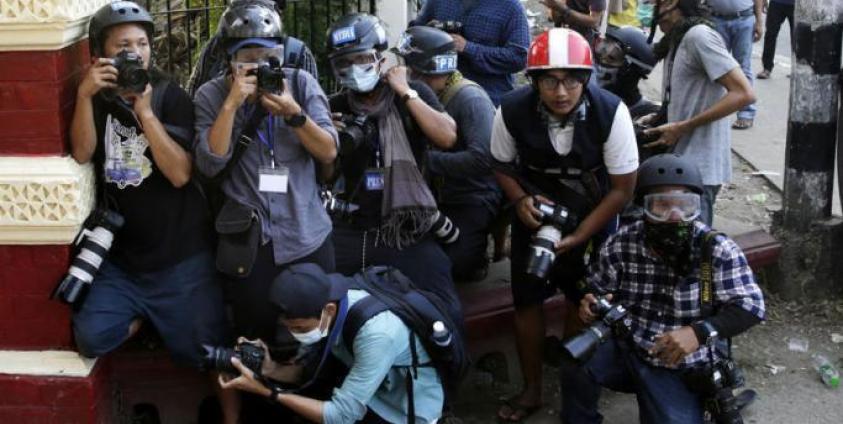As the world marks the importance of free media on World Press Freedom Day, many Myanmar journalists are struggling in the wake of last year's military coup.
World Press Freedom Day is on 3 May this year unfortunately, the press in Myanmar has been far from free in the past year.
2021 has probably been the toughest year for Myanmar media with the military junta’s oppression of the media and press.
After the coup, the military junta’s State Administration Council (SAC) revoked the licenses of 11 local media outlets and amended existing laws. They limited access to information and bought in more severe punishments to limit freedom of speech.
They regarded the media as the enemy and took legal action against the media using a new, very broad and vague law, Penal Code Article 505.
Article 505 states:
Whoever makes, publishes or circulates any statement, rumour or report,—
(a) with intent to -cause, or which is likely to cause, any officer, soldier, sailor or airman, in the Army, Navy or Air Force to mutiny or otherwise disregard or fail in his duty as such; or
(b) with intent to cause, or which is likely to cause, fear or alarm to the public or to any section of the public whereby any person may be induced to commit an offence against the State or against the public tranquility; or
(c) with intent to incite, or which is likely to incite, any class or community of persons to commit any offence against any other class or community, shall be punished with imprisonment which may extend to two years, or with fine, or with both.
Journalists are also often threatened with or charged with sedition under Penal Code Section 124 A, which can lead to a life sentence in prison. Sedition is defined as communications (written, aural or visual) that encourage people to hate the government, hold it in contempt or attempt to create disaffection with the government. The maximum sentence for sedition is life imprisonment.
Journalists are also prosecuted under other laws such as the anti-terrorism law and the electronic communication law, some of which can also lead to life imprisonment.
Even though some journalists in Myanmar are arrested and later freed, many others remain detained.
According to a 16 December 2021 statement by Reporters sans Frontières (RSF) a total of 488 journalists were arrested and detained worldwide. This was a 20 per cent increase on the number imprisoned globally in 2020, with China Myanmar and Belarus mainly responsible for that rise. Myanmar imprisoned 53 journalists. The only country to imprison more journalists in 2021 was China which imprisoned 127. Following Myanmar, the country that imprisoned the third most journalists was Vietnam, which imprisoned 43 journalists and Belarus, where 32 journalists were imprisoned, was fourth.
Conversely, 46 journalists were killed worldwide. This was the lowest figure for two decades but it still averages out at almost one journalist being killed a week.
In Myanmar in 2021 three journalists were killed and seven were tortured. According to reports, 115 journalists were arrested in Myanmar in 2021 and 14 were sentenced.
According to Detained Journalists Information Myanmar, 135 journalists were arrested in the year following the coup. Reportedly, six of them were sentenced to prison in March 2022 alone. Myanmar was ranked 140 th out of 180 countries in the 2021 Global Press Freedom Index.
World Press Freedom Day is celebrated every year on 3 May.
It was started by the UN General Assembly in 1993 following a Recommendation adopted at the twenty-sixth session of UNESCO's General Conference in 1991 that was based on the Windhoek in 1991.
Visual journalists take cover near the entrance of a monastery. Photo: EPA







